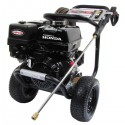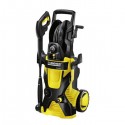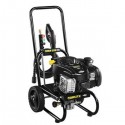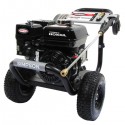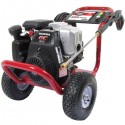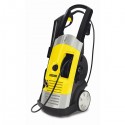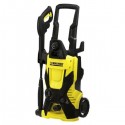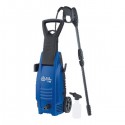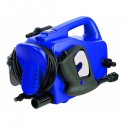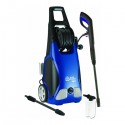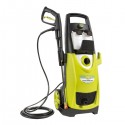Best Pressure Washer
These are the 10 best pressure washers based on product quality, customer satisfaction, and price:
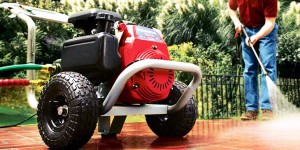 Whether you have your own small business doing contracting or landscaping work, or if you are simply a homeowner looking for a great way to make maintaining your property a lot easier, a pressure washer is just the right product for you. These machines are able to take big cleaning jobs that would typically take a number of hours – or even days – to complete and get them done in a matter of minutes. There are a wide variety of situations in which a pressure washer will be extremely useful, both on job sites and around the house. Finding the best one can be a bit of a challenge at first, but if you know what you should look for, it does not have to be.
Whether you have your own small business doing contracting or landscaping work, or if you are simply a homeowner looking for a great way to make maintaining your property a lot easier, a pressure washer is just the right product for you. These machines are able to take big cleaning jobs that would typically take a number of hours – or even days – to complete and get them done in a matter of minutes. There are a wide variety of situations in which a pressure washer will be extremely useful, both on job sites and around the house. Finding the best one can be a bit of a challenge at first, but if you know what you should look for, it does not have to be.
On job sites, commercial and gas powered pressure washers can make tasks that would typically take a crew of laborers half a workday to complete go by much more quickly. This is true whether you own a landscaping business, a painting company or are a general subcontractor. For landscapers, you can use a pressure washer to keep your tools and equipment clean and to wash off lawnmower decks. Painters can use pressure washers to strip loose paint from walls and for general cleanup. And contractors will find all kinds of uses for commercial pressure washers, whether they are doing demolition or construction.
Around the house there is almost no limit to what residential and electric pressure washers can do for you. You can use a residential pressure washer to clean windows – and you will not have to get up on a ladder to clean second story windows, either. You can blast mold and soap residue off of shower tiles in a matter of minutes with an electric pressure washer. Combine soap with the spray from a pressure washer and you will never have to go to the car wash again. In the yard, you can use a residential pressure washer to keep your grill sparkling clean, and make sure your lawn furniture looks practically brand new year after year. You can clean your vinyl or aluminum siding with a residential pressure washer, and clean fences and brick walls as well.
But there are so many options out there that it can be difficult to figure out which pressure washer is the best one for your needs. Not only are there several different categories of pressure washers to choose from, but within each category there are many different sizes and styles of pressure washers – and they have a wide degree of variance in terms of price range, as well.
But there are a number of basic characteristics that you can apply to your search for the perfect pressure washer that will ensure you have no problem picking out the best one for your needs. By using these characteristics, you will be able to narrow down your search to a short list of excellent pressure washers that are just right for you. Soon you will practically be and expert!
1. Best Pressure Washer Characteristics
1a. Highest Cleaning Power
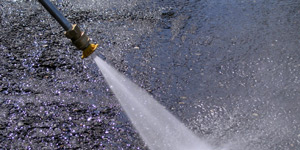 The very first thing you should look at when you are deciding which pressure washer is really the best one is its cleaning power rating. This is by far the most important characteristic of any pressure washer, and the one that will determine more than any other characteristic how convenient and effective a pressure washer will be. So you want to be able to quickly ascertain the cleaning power rating before you look at anything else. Fortunately for you, it is pretty easy to figure it out.
The very first thing you should look at when you are deciding which pressure washer is really the best one is its cleaning power rating. This is by far the most important characteristic of any pressure washer, and the one that will determine more than any other characteristic how convenient and effective a pressure washer will be. So you want to be able to quickly ascertain the cleaning power rating before you look at anything else. Fortunately for you, it is pretty easy to figure it out.
The cleaning power rating of a pressure washer is a function of two characteristics: the pressure and flow rate of the machine. The pressure is measured in pounds per square inch, and it describes the force with which the spray of water will be hitting a surface. Pressure can range from about 1200 PSI on smaller electric pressure washers all the way up to 3000 PSI or higher on big, gas powered commercial pressure washers. For the vast majority of tasks, both residential and commercial, a pressure of anywhere between 1600 and 2500 PSI is going to be more than sufficient.
The flow rate is measure in gallons per minute, and it describes how much water is passing through the spray nozzle at any given moment. Pressure washers generally have flow rates of anywhere between 1.2 gallons per minute on smaller residential models, and 2.0 gallons per minute on heavy duty commercial pressure washers. The flow rate is an important component of the cleaning power rating because it affects how wide the spray of water will be. A pressure washer that has a high PSI but a low flow rate will be able to hit a surface with a lot of force, but its spray will be extremely thin, which will make completion of jobs quickly a difficult task indeed.
The cleaning power rating is the product of the pressure and flow rate of the pressure washer. So a pressure washer that has a pressure of 1500 pounds per square inch and a flow rate of 1.4 gallons per minute will have a cleaning power rating of 2100. It is important when you are looking for the best in pressure washers to compare them in terms of the total cleaning power rating, rather than just the PSI or flow rate alone. That way, you can be confident that you are getting the very best one.
1b. Gas / Electric
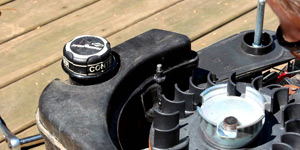 The other very important consideration to look at when you are deciding which pressure washer is the best one for your needs is whether you want it to be powered by gas or electricity. If you are buying a heavy duty commercial pressure washer, your options are pretty much limited to gas only. But for smaller residential models, both gas and electric pressure washers are available, and there are advantages and limitations to each.
The other very important consideration to look at when you are deciding which pressure washer is the best one for your needs is whether you want it to be powered by gas or electricity. If you are buying a heavy duty commercial pressure washer, your options are pretty much limited to gas only. But for smaller residential models, both gas and electric pressure washers are available, and there are advantages and limitations to each.
A gas powered pressure washer will generally be able to provide higher pressure and flow rates than most electric pressure washers can, although this is not universally the case. Gas pressure washers also have the distinct advantage that they can be used practically anywhere you might want to take them. That’s because they do not have to be tethered to an electric power supply. This is a feature of gas pressure washers that can be particularly advantageous, especially if you are using them on a new job site that is not yet hooked up to the grid.
Electric pressure washers are able to provide PSI and flow rates that are generally comparable to a number of gas powered units – they can often have PSI above 1800 and flow rates of 1.2 gallons per minute or higher. For the vast majority of tasks you might want to use a pressure washer for, this will have a cleaning power rating that is more than sufficient.
Electric pressure washers’ main disadvantage, then, is that they need a power supply to run them – and extension cords only go so far. But the option of running a machine on cleaner energy has its advantages. First of all, you will be able to run an electric pressure washer in an enclosed space without having to worry about inhaling harmful fumes – and this opens up a number of options that would not be available with a gas powered pressure washer.
The other advantage of running an electric pressure washer is that since it produces no emissions at the point of use, it is going to be much better for the environment than a gas pressure washer. This is no idle concern, either: small engine appliances are responsible for a large portion of the carbon emissions we are putting into the atmosphere. And a number of states have adopted California’s Air Resources Board standards for small engine emissions – which means many gas powered pressure washers cannot be used in them.
1c. Durable Parts
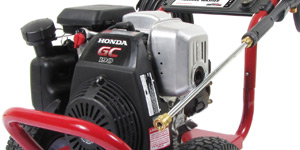 When you are on the hunt for a pressure washer that can truly be called one of the best, you should not stop with just any machine that has the right power source and provides a high PSI and flow rate. Plenty of pressure washers offer excellent cleaning power ratings, and while this is the most important characteristic of a pressure washer – and one that certainly influences whether or not it can be considered one of the best – a lot more goes into making a machine that is excellent all around. For that, you want to make sure it is made of the kind of parts and materials that will be very durable over the long term.
When you are on the hunt for a pressure washer that can truly be called one of the best, you should not stop with just any machine that has the right power source and provides a high PSI and flow rate. Plenty of pressure washers offer excellent cleaning power ratings, and while this is the most important characteristic of a pressure washer – and one that certainly influences whether or not it can be considered one of the best – a lot more goes into making a machine that is excellent all around. For that, you want to make sure it is made of the kind of parts and materials that will be very durable over the long term.
This starts with the engine in a gas powered pressure washer. Make sure that if the engine is made by an outside manufacturer, it is a quality name with a good reputation. This includes small engine manufacturers such as Briggs & Stratton, Honda or Kawasaki. You want to be able to count on the engine in a gas pressure washer – particularly if you are purchasing it to use in a professional capacity. Subcontractors and landscapers will be using their pressure washers far more than homeowners, so the hours will quickly add up. You want to be certain that you can rely on the engine to hold up to repeated use.
Whether you are purchasing a pressure washer for commercial or residential use, the body and accessories should all be made of durable materials as well. If you will be using your pressure washer on job sites, the body should be made of steel so that it can stand up to the kind of tough use it will be put through, and it should have a solid roll cage to protect it from bumps and dents. For residential uses, a pressure washer with a plastic body will usually do just fine, but you should make sure that it is durable plastic that will not crack easily if the pressure washer accidentally tips over.
It will be best if you can find a pressure washer with real rubber tires – and for commercial pressure washers, they should be pneumatic – but this is not always easy to do. If your model does have plastic wheels, make sure they are big and tough. And the hose should be PVC plastic at the very least, and preferably a carbon fiber weave.
1d. Excellent Design
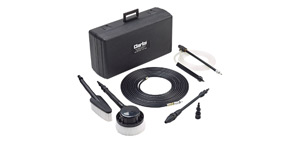 By now your list should be getting rather short indeed. You have eliminated any pressure washers that do not have the kind of cleaning power rating you need to tackle big jobs quickly and efficiently, and you have also gotten rid of those that do not have the right power source for your needs as well as any that are not made from high quality parts and materials. You should have a number of pressure washers left that are very durable and are able to provide high PSIs and flow rates. Now the question is: are they well designed?
By now your list should be getting rather short indeed. You have eliminated any pressure washers that do not have the kind of cleaning power rating you need to tackle big jobs quickly and efficiently, and you have also gotten rid of those that do not have the right power source for your needs as well as any that are not made from high quality parts and materials. You should have a number of pressure washers left that are very durable and are able to provide high PSIs and flow rates. Now the question is: are they well designed?
You do not want a pressure washer that is just tough and powerful. It is also important that it have a compact design and that it is not too heavy. The very best pressure washers will have been designed so that they are not bulky or overly top-heavy. They will have small enough footprints that they do not take up too much room in your work truck – in fact, all but the most heavy duty commercial models should really be able to fit in the trunk of a mid-size car. And you should have no problem finding enough storage space for them in your garage or tool shed.
It is not simply a matter of convenience – although that is important as well. If a pressure washer is not designed in such a way that it is sleek and compact, this is a fairly good indication that the manufacturer may have cut corners on other design elements as well. If they could not be bothered to make sure the footprint of the pressure washer was not too big, where else did their design fall short? I for one simply do not want to know, so the size of the pressure washer is a good benchmark for other aspects of the machine.
You also do not want it to be so heavy that it is difficult to lift up onto a high shelf in your garage or takes a lot of effort to maneuver it around your yard or work site. Sure, pressure washers have wheels, but they also should not weigh more than twenty pounds or so at the very most. They should be designed in such a way that they are not only compact but fairly lightweight as well. So compare the pressure washers that are left on your list and weed out any that are too big and bulky.
1e. Details Matter
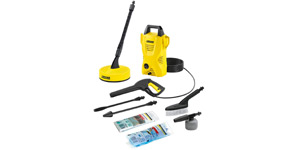 At this point you should have narrowed your list down to several of the best pressure washers for your needs: durable machines with excellent parts, the right power source and high cleaning rating. It can be difficult to decide between two pressure washers that have similar power and performance quality. This is when it is time to look at the small details.
At this point you should have narrowed your list down to several of the best pressure washers for your needs: durable machines with excellent parts, the right power source and high cleaning rating. It can be difficult to decide between two pressure washers that have similar power and performance quality. This is when it is time to look at the small details.
The accessories and design notes a manufacturer has provided on their pressure washer go a long way to determining which ones are very good and which ones are truly head and shoulders above the rest. That is because the accessories and small details are what is going to make the difference between the best pressure washers and all of the others.
For example, does the pressure washer have a reservoir for holding soap or just a siphon hose for drawing it from a separate bottle? While the siphon hose system works just fine, it is much more convenient to have a reservoir you can fill with soap and take with you with no problems. Even better is if the machine has two independent reservoirs, so you can fill one with one kind of detergent and the other with a different chemical solvent.
How many PSI settings does the spray wand have? At the very minimum it should have at least five. More are certainly better – because the more options you have for setting different PSIs and flow rates, the greater freedom you have to use your pressure washer for a number of different jobs.
Does the pressure washer have the option to provide a hot water spray, or is it cold water only? If you are buying a gas powered pressure washer, then you should find one that offers the hot water option. Hot water pressure washers can power though tough dirt and stains more quickly and often do so without the need for detergent.
The hose – and if the pressure washer is electric, the power cord – should be long enough to give you a wide range of motion around the machine. Otherwise you will have to be moving it with you much too often for it to be convenient. Make sure the hose is at least 25 feet long. It should also have a convenient storage spot on the pressure washer.
These are the kinds of details to keep an eye out for: they make a difference between good pressure washers and really great ones.
2. Best Pressure Washer
The best pressure washers may be gas or electric, or residential or commercial. The best one for you depends on factors such as what you intend to use it for, where you will be using it and how much money you plan to spend. But there is a perfect one out there for everyone.
2a. Best Electric Pressure Washer
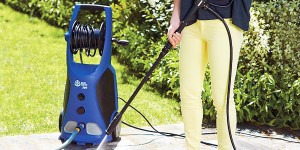 Electric pressure washers offer a lot of advantages to their owners. You do not have to worry about dealing with harmful fumes if you are using an electric pressure washer in an enclosed space. Electric pressure washers are easier to maintain, cheaper to run, and much quieter and more environmentally friendly than gas pressure washers. And contemporary technology has made them about as powerful as many gas pressure washers as well. They have high PSIs and flow rates. Their principal drawback to electric pressure washers is the fact that they always need to be relatively close to a power outlet to use them.
Electric pressure washers offer a lot of advantages to their owners. You do not have to worry about dealing with harmful fumes if you are using an electric pressure washer in an enclosed space. Electric pressure washers are easier to maintain, cheaper to run, and much quieter and more environmentally friendly than gas pressure washers. And contemporary technology has made them about as powerful as many gas pressure washers as well. They have high PSIs and flow rates. Their principal drawback to electric pressure washers is the fact that they always need to be relatively close to a power outlet to use them.
- Best Use: Smaller jobs, where a power outlet is readily available.
- Pros: Quiet, environmentally friendly, cheap to run and easy to use.
- Cons: Limited in terms of power; always need a power source nearby.
2b. Best Gas Pressure Washer
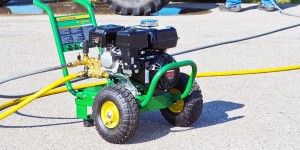 There are two major advantages to gas pressure washers beyond the fact that they are able to provide higher PSI and flow rates than many electric pressure washers can. Gas pressure washers are often equipped to provide sprays of water that are 180 degrees Fahrenheit or more, which can allow them to take care of difficult cleanup jobs much more easily than machines with cold water only can. And as long as you keep their tank full, gas pressure washers can go anywhere you can go – you never have to worry about having enough power. Their main drawback is that they produce a lot of emissions.
There are two major advantages to gas pressure washers beyond the fact that they are able to provide higher PSI and flow rates than many electric pressure washers can. Gas pressure washers are often equipped to provide sprays of water that are 180 degrees Fahrenheit or more, which can allow them to take care of difficult cleanup jobs much more easily than machines with cold water only can. And as long as you keep their tank full, gas pressure washers can go anywhere you can go – you never have to worry about having enough power. Their main drawback is that they produce a lot of emissions.
- Best Use: Heavy duty jobs and work sites without power hookups.
- Pros: Hot water spray option, and they can go anywhere.
- Cons: Are often not compliant with CARB regulations; cannot be used indoors.
2c. Best Residential Pressure Washer
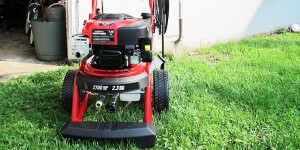 Having a residential pressure washer in your garage is one of the best things you can do to reduce your workload around the house. Whether you decide to go with a gas or electric powered residential pressure washer, you will soon discover that there is almost no limit to the number of jobs you can turn these machines’ powerful sprays on. You can use residential pressure washers on your car, the inside and outside of your house, all around the yard and elsewhere. Residential pressure washers can help you finish jobs quickly and efficiently, giving more of your precious weekend back to you.
Having a residential pressure washer in your garage is one of the best things you can do to reduce your workload around the house. Whether you decide to go with a gas or electric powered residential pressure washer, you will soon discover that there is almost no limit to the number of jobs you can turn these machines’ powerful sprays on. You can use residential pressure washers on your car, the inside and outside of your house, all around the yard and elsewhere. Residential pressure washers can help you finish jobs quickly and efficiently, giving more of your precious weekend back to you.
- Best Use: Home and garden cleaning jobs, washing the car.
- Pros: Compact and lightweight, these machines have myriad uses around the home.
- Cons: Are somewhat limited by the power of their spray compared to commercial models.
2d. Best Commercial Pressure Washer
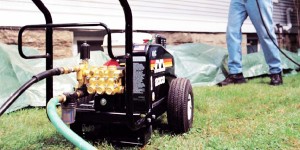 When you own your own contracting business – whether you are a painter, home remodeler, or own a landscaping company – you know how much work cleanup can be at job sites. With a commercial pressure washer, though, tasks that would normally take a few laborers an hour or more to finish can now be done by one person in minutes. And when you are on the job, every minute you can save is precious. A commercial pressure washer can provide the kind of reliable power and performance you need at the job site to tackle big, heavy duty chores very quickly.
When you own your own contracting business – whether you are a painter, home remodeler, or own a landscaping company – you know how much work cleanup can be at job sites. With a commercial pressure washer, though, tasks that would normally take a few laborers an hour or more to finish can now be done by one person in minutes. And when you are on the job, every minute you can save is precious. A commercial pressure washer can provide the kind of reliable power and performance you need at the job site to tackle big, heavy duty chores very quickly.
- Best Use: Subcontractors, painters, landscapers, construction or demolition.
- Pros: These machines are very powerful and built to last.
- Cons: They only run on gas, which presents some limitations, and are often not CARB-compliant.
By now you should feel very confident in your ability to pick out the best pressure washer for your needs. Whether you are a homeowner who needs a pressure washer for residential use, or you own your own business and need a commercial model, you should know exactly what to look for in order to find the best pressure washer.
These are the 10 best pressure washers based on product quality, customer satisfaction, and price:

